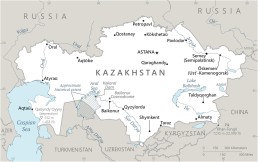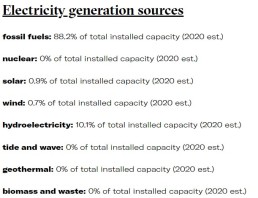UfU Informationen | Ausgabe 11 – Januar 2024 | Kamilya Tyulebayeva
Uncertainty between nuclear law and environmental democracy
A case from Kazakhstan
Im folgenden Artikel schildert unsere Gastautorin Kamilya Tyulebayeva die Situation der Öffentlichkeitsbeteiligung in Kasachstan anhand des Beispiels über die Errichtung eines Kernkraftwerkes. Kasachstan hat, wie die EU und Deutschland, ebenfalls die Aarhus-Konvention unterschrieben. Über diese Konvention haben wir in zahlreichen Artikeln berichtet. Sie garantiert das Recht auf Beteiligung in Umweltangelegenheiten und ist ein völkerrechtlich bindender Vertrag. Dieser gilt also auch in Kasachstan.
Leider, so zeigt Kamilya am Beispiel des Kernkraftwerkes auf, kollidieren die Beteiligungsrechte durch die Aarhus-Konvention mit nationalen Nukleargesetzen in Kasachstan. Diese Situation ist kein Einzelfall, der sich auf Kasachstan beschränkt, sondern kommt in zahlreichen Ländern vor. Kamilya erläutert diesen Konflikt.
Kamilya ist eine Umweltrechtlerin aus Kasachstan und hat in der Vergangenheit mit dem UfU gemeinsam an Projekten gearbeitet. Ihre Arbeit ist fokussiert auf die Einhaltung von Menschen– und Beteiligungsrechten in Umweltangelegenheiten. Da das UfU eine lange Tradition in der Stärkung von Partizipation und Beteiligung hat und inzwischen auch erste Projekte in Kasachstan durchführt, sind wir besonders glücklich darüber, mit Kamilya eine engagierte Kontaktperson vor Ort zu kennen, die für die selbe Sache kämpft.
Den nachfolgenden Artikel veröffentlichen wir auf Englisch. Gerne senden wir Interessierten auf Anfrage eine deutsche Übersetzung zu.
Nuclear power and energy policy decisions have historically been kept out of the public eye since they are typically viewed as matters of national security. Although the building of new nuclear power plants overlaps with environmental law, nuclear law is seen as a separate legal field where the public lacks participation and accessibility to information[1]. This situation is changing nowadays.
State of the art
Recognising the importance of the right to public participation is crucial and, over time, government practices have changed significantly and public participation in nuclear activities has increased in many countries. Transparency in the sharing of environmental information regarding nuclear activities has grown, and opportunities for public participation in nuclear sector decision-making are rising in occurrence. A famous example is the German Green Party, which roots in a civic movement against nuclear power in Germany. However, contradictions between nuclear and environmental laws, which guarantee public participation in such matters, still result in significant legal uncertainties which I will discuss later.

The dangerous nature of nuclear power brings in two important factors from the Aarhus Convention and the Espoo Conventions, both international treaties:
- Given that nuclear hazards are transboundary, it is important to recognize the wide geographic reach of participatory rights.
- It is crucial to include public opinions in risk assessments to comprehend the controversial status of nuclear energy as a source.
These two important factors have been designated since numerous legal disputes have been brought before the Aarhus and Espoo Convention Compliance Committees due to the complementary nature of nuclear activity and environmental democracy principles[2].
In response, specific guidance and best practices were developed in 2021 by the Meeting Parties[3] on the Aarhus and Espoo Conventions, addressing the application of these conventions in nuclear activities. Central to effective public participation is access to relevant information. The Aarhus Convention Compliance Committee emphasized that information actual to each decision-making stage, available to public authorities, must also be accessible to the concerned public. Non-disclosure of documents can be grounds for legal review under Article 9 of the Aarhus Convention, impacting public acceptance and legal certainty.
The Aarhus-Convention:
The Aarhus Convention is named after the Danish city of Århus, where the so-called „UNECE Convention on Access to Information, Public Participation in Decision-making and Access to Justice in Environmental Matters“ was adopted. The Aarhus Convention enshrines for the first time in international law the rights to information, participation and legal action as rights of every person to protect the environment, including for future generations. The convention includes the establishment of international minimum standards for access to environmental information, public participation and access to legal proceedings. The Convention is also the first international treaty to recognise that environmental protection and nature conservation often require groups, initiatives and organisations that are independent of the state. Non-governmental organisations (NGOs) or civil society initiatives act as representatives for the environment and nature in decision-making and court proceedings.
The Espoo-Convention:
The Espoo Convention obliges the Party of origin (state in which a project is planned) to assess the environmental impacts of a project on the neighbouring state (affected Party). The Espoo Convention also stipulates that the party of origin must inform the contact point of the affected party of all projects that are likely to have a significant adverse transboundary environmental impact. It gives the affected party the opportunity to participate in the environmental impact assessment procedure. The Espoo Convention also gives the public of the affected party (natural and legal persons and associations) the opportunity to comment on the project as part of the EIA. The environmental impact assessments of the project must also present the environmental impact on the neighbouring country. Finally, the Espoo Convention stipulates that the party of origin must also take into account the results of the consultation in the neighbouring country or countries (affected parties) when making its decision.
The situation in Kazakhstan
Kazakhstan is not only one of the largest players in uranium mining, it also has made several advancements in carrying out a plan to build a nuclear power plant since the 1990s and now is about to hold a referendum on the construction of a nuclear power plant in the country. The plan of the Ministry of Energy proposes the construction of a nuclear power plant to lessen the nation’s dependency on fossil fuels, diversify its energy sources, and cut CO2 emissions, and thus fulfill the obligations of the Paris Agreement. Undoubtedly, this solution to achieving carbon neutrality is very controversial, but aside from that, how the government is trying to implement the decision to build a nuclear power plant and convince the public is very vague.

As per Article 12 of the Law of the Republic of Kazakhstan „On the Use of Atomic Energy“,[4] to make a corresponding decision by the Government on the choice of the nuclear power plant location area, the consent of the local representative authorities (maslikhat) is required for the territory where the installation is planned. On 22nd of August 2023, public authorities of the Zhambyl district of the Almaty region initiated public hearings with local people on the issue of building a nuclear power plant in their territory. Representatives of Kazakhstan’s environmental NGOs and civil society expressed many concerns and questions during this public hearing. The public hearings that the local authorities announced did not adhere to any genuine legal standards.
Kazakhstan’s nuclear law does not include any provisions about public hearings, it just makes references to the environmental law. As per environmental legislation, the public must be provided with information regarding the construction of a nuclear power plant. The only information that the public got from the initiators of construction was the booklet with the explanation of the harm of nuclear activities relevant to the number of bananas (Pic 1).
Pic.1 Booklet from the public hearings on 22 August 2023[5].
Nonetheless, the Ministry of Energy’s website has the following details on public hearings planned for August 22nd, 2023:
“The hearings are planned to address environmental issues, health concerns, the impact of natural-climatic factors on the nuclear power plant, economic factors, infrastructure development, the impact of the nuclear power plant on the development of small and medium-sized businesses, as well as other relevant issues. During the hearings, citizens will have the opportunity to ask any questions of interest to them, both regarding the safety of technologies and the socio-economic aspects of nuclear power plant construction”.
It would seem that such questions are already a subject of informed public consultation as part of the Environmental Impact Assessments that are regulated by the environmental law in Kazakhstan.
While this situation confuses and the question arises: What was intended to be discussed at the public hearings, without providing adequate information about construction plans? What was this all about? Presumably, public authorities have tried to convince the local population of their validity or maybe they looked for a place where there would be the least amount of opposition[6].

In the end, after the failure of these public hearings, President Kassym-Jomart Tokayev announced the decision about the construction of a nuclear power plant would be taken through a national referendum. The date of the vote has yet to be determined. A referendum decision could also create uncertainty, as it is uncertain whether the decision would be final.
The ambiguity of the situation
Kazakhstan signed the Aarhus Convention on 25th of June, 1998 and ratified the international treaty on 11th of January 2001. Therefore, Kazakhstan is bound to this treaty, which guarantees public participation in such matters. Nonetheless, uncertainty regarding public participation in nuclear activities is not something that occurred for the first time in countries, which signed the convention. This uncertainty was subject of communication by the Aarhus Convention Compliance Committee in the case of Belarus[7]. The Committee asks the Party to amend the law and designate which decision would be considered to be the final decision permitting the activity in terms of Article 6, paragraph 9, of the Aarhus Convention. As in the case of Belarus, the nuclear law of Kazakhstan does not mention the final decision about the construction of a nuclear power plant.
Furthermore, in its recommendations, the Committee asks the Party (Belarus) to ensure the compatibility and coherence between the environmental legal framework for public participation in decisions on specific activities and the framework for public participation applicable to nuclear activities. In this case, the Committee found that Belarus failed to involve the public at the earlier level when the Party made a selection of the location for the construction of a nuclear power plant. Thus, once the decision to permit the proposed activity in the designated area has already been taken without public involvement it will be not in compliance with Article 6, paragraph 4 of the Aarhus Convention, which requires to provide for “early public participation when all options are open”. In Kazakh nuclear law the decision about the place of construction is taken by the public authorities with the remarks subject to the requirements of environmental legislation.
Early stages of decision regarding the construction of a nuclear plant may involve various consecutive strategic decisions under Article 7 of the Aarhus Convention (policies, plans and programs). The decision to use nuclear energy in Kazakhstan and to build nuclear facilities (including potential locations) was already outlined in the 2014 energy policy.[8] The public must be involved in the adoption of the energy plan, which should be viewed as a policy decision. However, there was no public participation throughout the development of Kazakhstan’s energy plan.
Since Kazakhstan has been a party to the Aarhus Convention since 2001, its nuclear law contradicts the Convention. There is an evident contradiction in the legal framework regarding decision-making for nuclear-based activities. Kazakh nuclear law, as it was in case with Belarus, does not contain a provision about
Energy decarbonization
Nuclear energy is viewed by certain states as a decarbonized energy source that helps states fulfill their obligations under the Paris Agreement and the Sustainable Development Goals[9]. However, the Meeting of the Parties to the Aarhus and Espoo Conventions emphasised the importance of remembering that the transition to sustainability requires a move away from the risks that nuclear energy poses to the environment and to people, even if it offers security of supply and protection from fluctuating energy prices.
The scope of public involvement, both materially and temporally, is one of the distinctive contributions that have emerged from the specific guidance and best practices developed in 2021 by the Meeting Parties on the Aarhus and Espoo Conventions. Public participation in the planning process must begin early, the assessment phase of a particular project is not the appropriate time to address questions about national energy strategy related to the energy source selection. Consultation with the public at the planning or program stage, which establishes the framework for ad hoc project activities, could help states avoid conflicts or at least minimize them beforehand. For the clean energy transition to be democratic, public participation at the highest planning levels is essential. The recommendations state that although decision-making authorities are free to choose which options to present at each stage, nonetheless “irrespective of how the framework for decision-making is structured, the public should have a possibility to discuss the nature of and need for the proposed activity at all.[10]”
Moreover, the Espoo Convention ensures that the diversity of options in terms of energy sources can be fully assessed by the neighbouring countries. By the Espoo Convention, the EIA report must include acceptable alternatives (including those about location and technology), present them comparably and transparently, and take into account a „no-action alternative.“ It is anticipated that states will need assistance in defining new energy policies that are more participatory in character as a result of the recent clarifications about the timing and extent of public input. Therefore, Kazakhstan in addition to consulting with its citizens, should not forget to consider neighbouring countries’ opinions to make a sustainable decision regarding the construction of a nuclear power plant.
[1] Duvic-Paoli, L. A., & Lueger, P. (2022). A Democratic Nuclear Energy Transition? Public Participation in Nuclear Activities. Review of European, Comparative and International Environmental Law, 31(2), 199-209.
[2] Ibid
[3] UNECE ‘Report of the Ninth Meeting of the Task Force on Public Participation in Decision-Making under the Aarhus Convention’ UN Doc ECE/MP.PP/WG.1/2021/4 (March 2021
[4] Law of the Republic of Kazakhstan „On the Use of Atomic Energy“ https://adilet.zan.kz/rus/docs/Z1600000442
[5] https://ecostan.rocks/npppublicparticipation/
[6] https://ecostan.rocks/nuclearpowerplant/
[7] Findings and recommendations of the Compliance Committee concerning communication ACCC/C/2009/44 concerning compliance by Belarus, 28 June 2011
[8] Kazakhstan’s energy strategy https://adilet.zan.kz/rus/docs/P1400000724
[9] Duvic-Paoli, L. A., & Lueger, P. (2022). A Democratic Nuclear Energy Transition? Public Participation in Nuclear Activities. Review of European, Comparative and International Environmental Law, 31(2), 199-209.
[10] Maastricht Recommendations on Promoting Effective Public Participation in Decision-making in Environmental Matters Prepared under the Aarhus Convention


